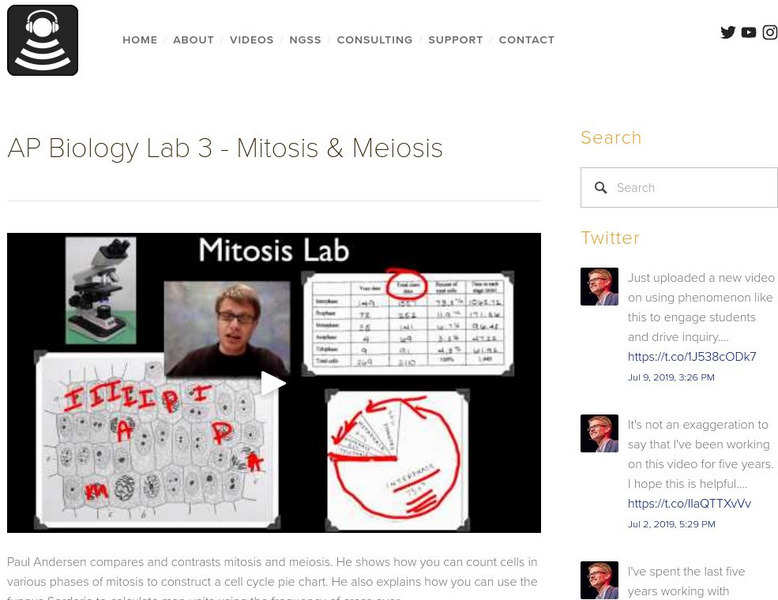Amoeba Sisters
Mitosis vs. Meiosis: Side by Side Comparison
After learning about mitosis and meiosis from our individual videos, explore the stages side by side in this split screen video by The Amoeba Sisters! Expand video details for table of contents. Vocabulary in this video includes...
Bozeman Science
AP Biology Lab 3: Mitosis and Meiosis
Paul Andersen compares and contrasts mitosis and meiosis. He shows how you can count cells in various phases of mitosis to construct a cell cycle pie chart. He also explains how you can use the fungus Sordaria to calculate map units...
Amoeba Sisters
Meiosis (Updated)
Updated meiosis video. Join the Amoeba Sisters as they explore the meiosis stages with vocabulary including chromosomes, centromeres, centrioles, spindle fibers, and crossing over. Major Points in Table of Contents: Intro 00:00 Mitosis...
Curated Video
Comparing Cell Division
New Review2 minute video comparing mitosis and meiosis for middle school science
Bozeman Science
Unit 5 Review - Genetics
Paul Andersen reviews the major concepts within the fifth unit of the new AP Biology framework. He starts with a description of both DNA and RNA. He explains how DNA is copied during the S phase of mitosis. He explains how transcription...
Bozeman Science
AP Biology Labs - part 1
Paul Andersen details the first 7 of 13 labs in the AP Biology Curriculum. The following topics are all covered: Artificial Selection, Hardy-Weinberg Equilibrium, Comparing DNA using BLAST, Diffusion and Osmosis, Photosynthesis,...
Bozeman Science
Meiosis
Paul Andersen explains how the process of meiosis produces variable gametes. He starts with a brief discussion of haploid and diploid cells. He compares and contrasts spermatogenesis and oogenesis. He explains how each person is...
Bozeman Science
Mutations
Paul Andersen describes the major mutations found in the living world. He starts with an analogy comparing the information in DNA with the information in a recipe. Changes in the DNA can result in changes to the protein, like changes in...
Bozeman Science
Meiosis
An informative video overviews haploid versus diploid cells, how meiosis, fertilization, and mitosis all work together, how mitosis and meiosis differ in their processes and end results, and concludes with a brief discussion about...
Bozeman Science
Cell Division
It is hard to believe a 300-foot-tall Redwood tree began as a single cell hundreds of years ago. How did it grow so large? Observe how different kinds of cells (bacteria, sex cells, and eukaryotic cells) reproduce or make more cells...
Amoeba Sisters
Asexual and Sexual Reproduction
Why do some organisms reproduce sexually, others reproduce asexually, and some both? Biology scholars examine the pros and cons of sexual and asexual reproduction through a short, informative video. The resource offers great examples of...
Amoeba Sisters
Meiosis
Why do siblings often look so different from one another? Discover the process of making gametes using a short video from a large biology playlist. The narrator explains each step while animated chromatids play out the scenario that...
Amoeba Sisters
Meiosis: The Great Divide
Learning about meiosis requires your undivided attention. The video covers meiosis including detail about all eight phases. It provides compare-and-contrast examples between meiosis and mitosis.
Khan Academy
Khan Academy: Cell Division: Meiosis: Comparing Mitosis and Meiosis
A video discussing the similarities and differences between the processes of mitosis and meiosis. Learn how mitosis results in two identical diploid cell while meiosis results in four haploid genetically different cells. [5:50]
Khan Academy
Khan Academy: Reproduction and Cell Division: Comparing Mitosis and Meiosis
Comparison of the processes of mitosis and meiosis. Mitosis produces two diploid (2n) somatic cells that are genetically identical to each other and the original parent cell, whereas meiosis produces four haploid (n) gametes that are...
Bozeman Science
Bozeman Science: Ap Biology Lab 3 Mitosis & Meiosis
Paul Andersen compares and contrasts mitosis and meiosis. He shows how you can count cells in various phases of mitosis to construct a cell cycle pie chart. He also explains how you can use the fungus Sordaria to calculate map units...
Bozeman Science
Bozeman Science: Ap Biology Labs Part 1
Paul Andersen details the first 7 of 13 labs in the AP Biology Curriculum. The following topics are all covered: Artificial Selection, Hardy-Weinberg Equilibrium, Comparing DNA using BLAST, Diffusion and Osmosis, Photosynthesis,...









